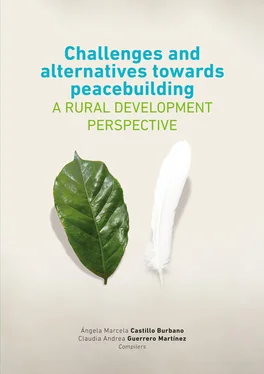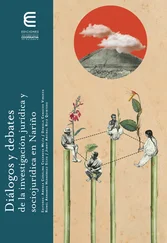To the institutions that participated in the inter-institutional alliance, led by the Universidad Cooperativa de Colombia - Campus Pasto, the mediator for this research exercise, bringing together institutions such as the Corporación Unificada Nacional de Educación Superior (CUN) sede Pasto, Corporación Universitaria Minuto de Dios (UNIMINUTO), Centro Regional Pasto and the Universidad Politécnica Estatal del Carchi (UPEC), as allies within International Higher Education; and to the National Federation of Associated Coffee Growers in the department of Nariño, who joined forces to achieve the proposed objective during the development of the research exercise with the implementation of various strategic proposals. To the community, the coffee growers and rural youth, who opened the doors to their homes, their land and their experiences when accompanying them in the process of formation and active participation, and were willing to take on new challenges. To the research groups that formed the articulation of research processes between higher education institutions. To the authors who, with their dedication and effort, have managed to collect, experience, interpret and reveal to the academic community, the reality of our country and the reality of the communities that participated in this project.
Prologue
Contextualization of the collective work
Introduction
part 1. Peacebuilding and human rights
Chapter I. The challenges of building a stable and lasting peace in Colombia
Chapter II. Dynamics of conflict and post-agreement in the Nariñense territory
Chapter III. A sociodemographic view and a look at health conditions prior to the implementation of peace agreements in the municipalities of Leiva, Policarpa and Los Andes in Nariño
part 2. Education for Rural Development
Chapter IV. Education and pedagogy when faced with the challenges of rural Colombia
Chapter V. Challenges and opportunities of rural education in Nariño in the post-conflict context
Chapter VI. Strategies for student retention and wellbeing using virtual higher education as a tool for inclusion in the cases of Leiva, Policarpa and Los Andes - Sotomayor
Chapter VII. A look at rural development in Latin America: the agrarian question and the established economic models
Chapter VIII. Development and the solidarity economy: reflections on the peace agreement in Colombia
Chapter IX. Rural associativity and agricultural producers
Chapter X. Social responsibility: a strategy for rural strengthening
Chapter XI. The impact of good practices in coffee production as an alternative for rural development in the municipalities of Leiva, Policarpa and Los Andes
General conclusions of the study
List of Abbreviations
Researchers
Acknowledgments
To the Ministry of National Education of Colombia, for making it possible for higher education institutions in Southwest Colombia, to participate in the “Call for the formation of a bank of eligible higher education projects that promote rural development through the formation of inter-institutional alliances”; an exploration of ideas to improve the conditions and quality of life of the department’s coffee growers.
To the institutions that participated in the inter-institutional alliance, led by the Universidad Cooperativa de Colombia - Campus Pasto, the mediator for this research exercise, bringing together institutions such as the Corporación Unificada Nacional de Educación Superior (CUN) sede Pasto, Corporación Universitaria Minuto de Dios (UNIMINUTO), Centro Regional Pasto and the Universidad Politécnica Estatal del Carchi (UPEC), as allies within International Higher Education; and to the National Federation of Associated Coffee Growers in the department of Nariño, who joined forces to achieve the proposed objective during the development of the research exercise with the implementation of various strategic proposals.
To the community, the coffee growers and rural youth, who opened the doors to their homes, their land and their experiences when accompanying them in the process of formation and active participation, and were willing to take on new challenges.
To the research groups that formed the articulation of research processes between higher education institutions.
To the authors who, with their dedication and effort, have managed to collect, experience, interpret and reveal to the academic community, the reality of our country and the reality of the communities that participated in this project.
Prologue
In his novel, The Book of Laughter and Forgetting, the Czech writer Milán Kundera, recounts how communist leaders, not related to the Russian government, were erased from history. The crude and uncomplicated process consisted of modifying the photos where the indicated character had appeared, changing his name in the records of the speeches and forcing people to affirm that they did not know them. Obviously, this move, whose purpose was to stimulate oblivion, generated a public dynamic of acceptance, but promoted intimate reflection exercises, where people, in the most remote part of their homes and their memory, remembered those who no longer existed, with the purpose of keeping them alive, separated from slander.
This same form of memory preservation appears in the works of Gabriel García Márquez, the Colombian winner of the Nobel Prize in Literature 1982, who narrates in One Hundred Years of Solitude, that when José Arcadio Segundo asked about the massacre of the three thousand workers who demanded their rights in front of the banana company and everyone answered that that had not happened, he made it his duty to explain this to his people, his nephews and those of his household, as a story, to experience it, so that their memory somehow kept the events a reality; one that the inhabitants of Macondo now considered strange and pure fantasy.
Garcia Márquez and Milan Kundera are two examples of how literature extracts the facts of reality and captures them in a lively, exhilarating way so that in reading the texts you can once again feel the indignation, dismay, laughter, joy and lament that make up life. This practice of transmitting emotions is also carried out by the indigenous communities of Colombia, who make it their moral duty to pass on stories and legends to future generations through the spoken word, recounting the facts and events of their people, with the purpose of forming an identity, of knowing that they are someone and that they belong to each other.
From this practice of the indigenous communities, and paraphrasing the Canadian philosopher Charles Taylor, who affirms that the configuration of the Self is defined by interpersonal relationships and by the historical relations of one’s ancestors, it can be said that there is a close relationship between memory and identity, in that we can only know what we are if we remember what our ancestors were. Paraphrasing a quote from Marx, we can say that our identity rises from the shoulders of our ancestors.
The book before the reader is perhaps a clear example of how memory seeks to survive, to make its existence evident. This is stronger in the Colombian territories, where its presence was more direct. For that reason, although we do not want to talk about it, it is irremediable to do so; it seeps out through the pores, where one least expects it. This document is not creative literature or fiction but the result of research by experts with different fields of expertise, who intend to trace a reality, to record a small period in time where the noise of weapons and the smell of the cordite, which sowed anxiety and uncertainty, gave way to the grinding of beans and the smell of coffee, sowing hope and enthusiasm among populations that believed for many years that they were the doomed lineage of which García Márquez spoke.
Читать дальше












